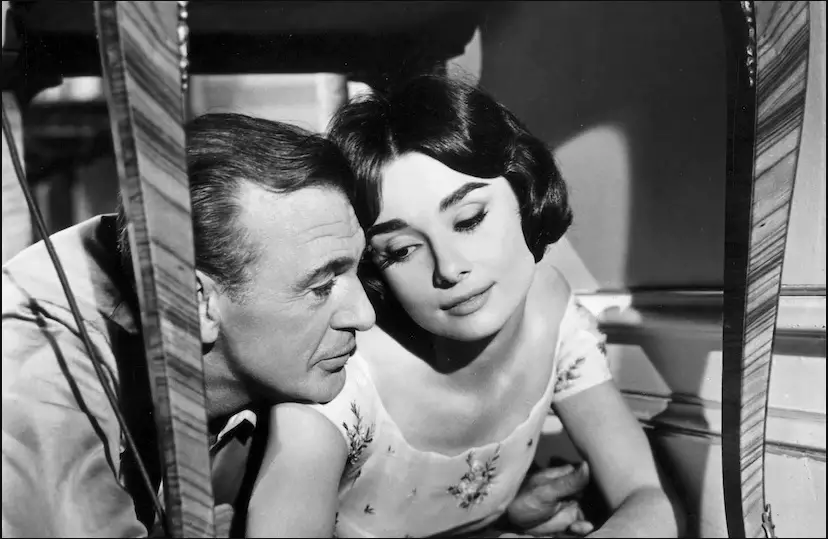
Love in the Afternoon, starring Gary Cooper and Audrey Hepburn, is Billy Wilder’s best attempt at making a film in the spirit of his late mentor, Ernst Lubitsch.
Ariane Chavasse (Audrey Hepburn) is a cello student and overhears a conversation between her private detective father, Claude Chavasse (Maurice Chevalier), and a client, Monsieur X (John McGiver). Claude’s specialty is going after the spouses who are unfaithful. Anyway, Monsieur X insists that he will kill American businessman Frank Flannagan (Gary Cooper) himself. When Ariane cannot get through to his room at the Ritz, she goes there herself. The two eventually spark up a relationship, mostly in the afternoons due to Ariane having practice in the evening.
Cut to the next year when Frank finds Ariane back in his life again. This time, he’s the one hiring Claude to investigate Ariane as Frank still doesn’t know her name. It doesn’t take long for Claude to put two and two together and tells him. Ariane has serious feelings for Frank but he has this way of running away when things start getting serious with women. It’s not until Ariane chases him down at the train station in which she drops her femme-fatale persona and he sweeps her off her feet.
Let’s get the film’s main problem out of the way. There is not a single universe where I can buy into Audrey Hepburn ending up with Gary Cooper. This film has the same problem that plagued Sabrina just three years earlier. Cooper is too old for Hepburn as there is an almost thirty year age different between them. Listen, both Cooper and Hepburn are screen legends but I have a better time buying them as father and daughter than as a romantic couple. And this, in turn, is the problem with the film. Even with the Production Code a few years away from its demise, one wonders how this one made it through the censors. The film’s end narration alerts us that they end up together and this is because of the Catholic Legion of Decency.
That it’s impossible to buy into them being a couple is what really complicates matters for this film. One must suffer through the overly long two-hour, ten-minute run time before the film is over. This is easier said than done and I’m not just going to half-ass myself and call it an hour into the film. Trust me, you don’t know much self-restraint there was on this end. Billy Wilder may be great at writing and directing but this film is terribly miscast. Not so much in the case of Audrey Hepburn and Maurice Chevalier but Gary Cooper. Even Wilder himself admits it as quoted by biographer Ed Sikov on page 397 in On Sunset Boulevard: “It was a flop. Why? Because I got Coop the week he suddenly got old.”
In both films starring Hepburn, Wilder knows how to play to her strengths. What he doesn’t do is come up with original characters. This isn’t to take away anything from his writing ability but one would think he would come up with an original idea. And yet, both films are adaptations.
In another universe, Wilder could have been directing Cary Grant or Yul Brynner in the role of Frank. Grant’s pickiness about roles would mean never collaborating with Wilder. It would have been far easier buying into Brynner and Hepburn than Grant and Hepburn given their age difference. Scott Eyman writes about this on pages 320-321 of his Cary Grant biography.
One of the film’s musical selections at the opera house is a Richard Wagner piece. I’m honestly surprised that Wilder would allow this in one of his films. Any other composer would have been preferable since Wagner’s antisemitism is well known.
Love in the Afternoon marks the screenwriting first team-up between Wilder and I.A.L. Diamond. Their work together in this would win them a WGA award while Wilder also received a DGA nomination. For one reason or another, they did not work together on Witness for the Prosecution. In any event, this team-up would last through 12 screenplays together and culminate with Buddy Buddy in 1981. This film, however, pays homage to the late filmmaker Ernst Lubitsch. Two of his films, The Merry Widow and Bluebeard’s Eighth Wife, star Cooper and Chevalier, respectively, and deal with similar romances.
Love in the Afternoon relies on buying into Cooper and Hepburn ending up together and that’s why this film fails.
DIRECTOR: Billy Wilder
SCREENWRITER: Billy Wilder and I.A.L. Diamond
CAST: Gary Cooper, Audrey Hepburn, Maurice Chevalier, with John McGiver



